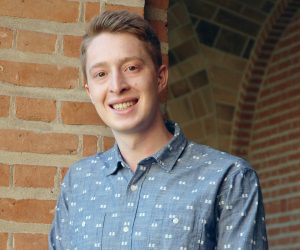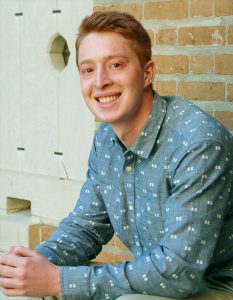 Noah Zempsky moved from a small private school in Connecticut to a small private university in Texas with the intention of following a career path that blended math and biology. “I was thinking bioinformatics or biomathematics, but as I was laying out my first semester course schedule someone recommended I take a computer science course,” he said.
Noah Zempsky moved from a small private school in Connecticut to a small private university in Texas with the intention of following a career path that blended math and biology. “I was thinking bioinformatics or biomathematics, but as I was laying out my first semester course schedule someone recommended I take a computer science course,” he said.
He signed up for COMP 160, a class on computer game creation, and focused on getting research experience in a biology lab. Zempsky said, “I’d never taken a computer science class before and had no idea what it involved. But it was interesting, a fun way to get interested in computer science. Over time, I realized I was enjoying the COMP class more than my time in the lab and my focus started to shift.”
Zempsky took a second course, COMP 182 in the spring of his freshman year. He said, “I invested a lot more of my time in it [than COMP 160], and enjoyed how it worked my brain in a different way. It was like solving puzzles and I started to dread going to work in the bio lab.”
He attributed some of his preference for CS to the obvious results of solving a problem. “In the biology lab, the approach was more along the lines of ‘guess and check’ but in CS, you are designing something that solves a problem and I found a lot more satisfaction in that. Eventually, I was much more interested in computer architecture and the design of programs than the biology part.”
Even though his interest was shifting, he continued to work in the biology lab his sophomore year and he began to receive assignments that were related to his programming experience. “I even got credit for my work in the lab,” he said. “I was helping the grad students learn how to code in Python and created a program that allowed them to compare sequences of DNA from different species of mouse to learn more about the way in which they evolved.”
Then he was offered an internship in the technology industry after attending a conference designed to help bridge the gap between college students and employers.
“My advice to other CS students and prospective CS students is ‘go to conferences,’ and make contacts,” he said. “Look for conferences that appeal to your interests. They are usually pretty easy to get into, but unfortunately don’t get nearly enough publicity. Then once you’re there it’s up to you to make the most of the experience.”
 Although it resulted in an internship offer, Zempsky’s first conference was definitely a learning experience and challenged him to make his voice heard over more extroverted attendees. He said, “Taking the risk, flying out to conferences in San Francisco and New York was a leap for me, but it was really important. Especially if you are a shy person, you have to push past the social anxiety and put yourself out there.”
Although it resulted in an internship offer, Zempsky’s first conference was definitely a learning experience and challenged him to make his voice heard over more extroverted attendees. He said, “Taking the risk, flying out to conferences in San Francisco and New York was a leap for me, but it was really important. Especially if you are a shy person, you have to push past the social anxiety and put yourself out there.”
In addition to making connections at conferences, Zempsky encourages other students to reach out to their peers or recent alumni. He said, “Networking is more important than most people realize. Don’t overlook the personal reference–one of my internships came through asking someone to refer me. When you have a friend or classmate in the internal system, a lot of time you get that first interview because someone has already vouched for you.”
Zempsky also recommends building connections with a study group. He said working with a group of people in the same major helps everyone in the group. “Talk about the assignments, ask questions, and answer questions. Teaching someone else how to do something really helps you know it better yourself. In Sid, we started a small group in our sophomore year–about five people who rotated in and out, depending on the COMP classes we were taking. There was this one power strip in the corner of our commons; we called it the ‘CS Corner’ because we ended up heading there to charge our computers and stayed to hang out and work on our problem sets.”
Seeking the Small Startup
As Zempsky’s confidence grew, he sought smaller and smaller work environments. He said, “My first internship was in a company of about 15,000 employees. I had to get dressed up every day for work and I sat in the middle of a cube farm. My next internship was in a company of about 1500 employees and I did a lot of my work in a hammock in an indoor park they’d set up in the office. After graduation, I’m joining a startup that expects to grow to 150 employees by the time I get there.”
In his experience, working at a bigger company means you’ll be in a more specialized role with a much smaller scope. Zempsky said, “The smaller the company, the less corporate the environment and the more effect you can have. Instead of fixing code, you are creating something.”
Noah Zempsky completed his B.A. in CS in 2017.
